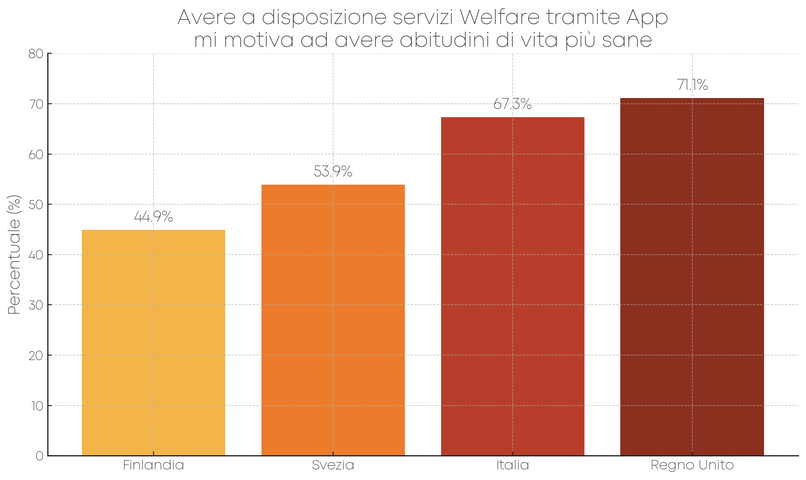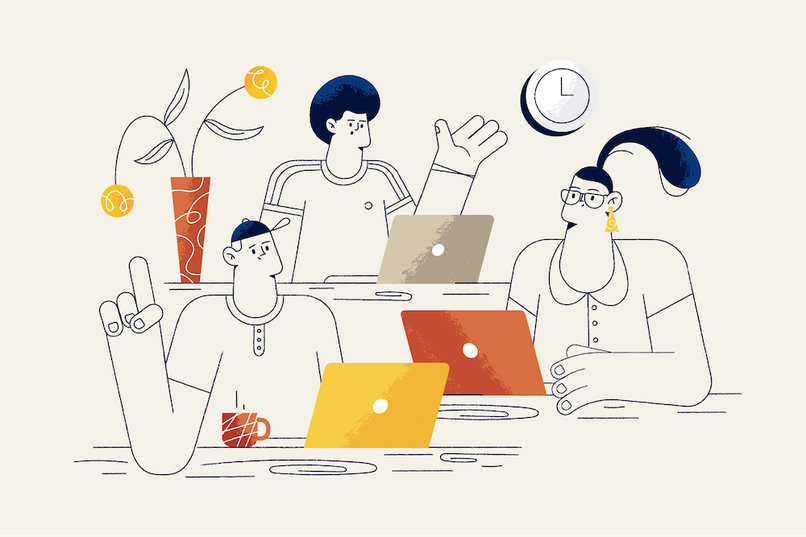Thanks to new trends and ever-evolving technological innovations, the future of the world of work is also preparing to experience many changes.
Redesigning planning, human-AI partnerships, creating a fluid workforce based on skills, implementing hybrid models and introducing Mobile Benefit Apps are increasingly relevant topics today.
Let's try to take stock of the situation, to understand how to redefine productivity and promote a positive work environment, thanks also to a responsible implementation of AI , which allows companies to fully exploit the new technological potential and increase it in their Corporate Welfare plan.
Welfare and technological innovation: the future of the world of work
Key trends that are shaping the future of work include the ever-increasing use of technology and - inevitably - the rise of Artificial Intelligence (AI) or Artificial Intelligence (AI) .
In fact, digitalization - and in particular generative AI - is transforming the way we work.
Organizations must therefore learn to exploit its power, to improve flows, automate routine tasks and improve decision-making, obviously also acquiring new skills, when necessary.
As technology evolves, the skills required also evolve accordingly and change very rapidly, but - as much as it may seem like an inconvenience to say so - there are many benefits offered by modern technology, which stimulates continuous growth.
The ever-increasing ability to collect , cross-reference and analyze data with AI can change the approach to planning, to anticipate talent gaps and ensure a future-ready workforce, thanks to a culture of lifelong learning.
With the flattening of hierarchies, managers must become coaches , mentors and authentic leaders . They must provide learning opportunities, skills development projects and empathetic support to their Team .
As we know, however, the rise of the hybrid work model is already underway and requires adapting to new ways of working, creating different opportunities for collaboration and meeting, but also - inevitably - increasingly introducing technology into the daily workflow .
In doing so, the simplification of processes and interactions, achieved through the exploitation of technology, also has a positive impact on health, safety and well-being. psycho-physical well-being of employees , which is already fundamental today and will be increasingly so in the future.
We need to focus on creating an increasingly holistic work experience that takes into account employee needs and fosters purpose and meaning in work.
If that were not enough, this push towards automation, digitalization and interconnectivity of Industry 4.0 is already materially translating into a clear increase in productivity, creativity and well-being in the industrial context.
Speeding up production processes, increasing productivity, improving quality, making the company more flexible and adaptable, reducing costs and increasing creativity are just some of the many advantages resulting from a close collaboration between technology and Welfare.
The future of work is – fortunately or unfortunately – always characterized by rapid change, with technological advances and evolving expectations, both on the part of employees and employers.
So now let's understand in practice how some technological tools can help businesses, to always keep up with the changing times!
Mobile Benefit App
Welfare platforms , i.e. a digital tool that allows companies to optimize the management and offer of services designed for their employees, have already allowed us to see how technology can be put at the service of the company and the worker, making Welfare more intuitive and easily accessible to all.
But among the simplest and smartest tools offered by modern technology, there are not only platforms: also corporate Apps, designed for Welfare that are starting to be a solution that intrigues Italian companies.
In Italy, in fact, Mobile Benefit Apps - although growing - are not yet very widespread, but in Northern Europe (especially in Sweden and Finland, always pioneers in this sense) companies that use Welfare Apps are now more than 85%.
According to research GEBS ( Great Employee Benefit Study ) conducted in collaboration with the Epassi group , employees greatly appreciate Mobile Benefit Apps, considering them a practical support in terms of:
● timing (speeding up processes);
● payments (safe and immediate);
● health and wellbeing (especially in the UK and Italy, workers attribute to apps the value of being able to promote healthier habits);
● sustainability (thanks to data monitoring and forecasting).

Interesting data, which already show us possible potential trends: just think that in Italy already 67.3% of the interviewees believe that Welfare apps allow them to adopt healthier habits.
Apps - like Euty - guarantee continuous listening and dynamic responses, supporting the company and bringing Welfare closer to people , with a personalized approach . customized to respond individually to the needs of all generations present in the company , supporting psycho-physical well-being and supporting family care .
Furthermore, from a practical point of view, Mobile Benefit Apps allow employees maximum customization in:
● manage your Welfare vouchers;
● select the desired services;
● monitor the balance of your vouchers independently.
In 2024, 97.9% of companies in Finland used Mobile Benefit App, 85.3% in Sweden, 74% in Italy and 65.9% in the UK.
Let's now move on to artificial intelligence, focusing not so much on its role in the future of work, but more specifically on its impact on welfare and the possibilities it can offer companies, to increase productivity, promote a positive work environment, and be more proactive.
Artificial Intelligence (AI) & Welfare
Despite the increasingly widespread tendency to associate artificial intelligence with the risk of job losses, there are also other important issues to take into account for a positive evolution of work.
AI is starting to have a significant impact on Corporate Welfare, offering new opportunities to personalize benefits , improve program efficiency, and make services more accessible to employees.
Artificial intelligence can in fact help companies create more personalized welfare plans : through People Analytics systems , it is possible to analyze large amounts of data from different sources, such as surveys, questionnaires, feedback and performance indicators (KPI).
Data helps you better understand employee needs and preferences, identifying patterns and trends.
Thanks to these analyses, companies can then create Welfare plans profiled on the real needs of employees, offering more appreciated and requested benefits.
AI can also be used to automate and simplify HR's work , freeing up time for more strategic activities, while AI-powered digital platforms can make it easier for employees to access and manage benefits on their own, automating many processes, such as welfare credit management, reporting and invoicing.
Some companies are also using AI to create “recommender” systems that suggest benefits to employees that are best suited to their needs and that analyze data on benefits usage to identify new trends and potential improvements.
In terms of health, AI could be integrated with the Internet of Things (IoT) , to monitor employee well-being and provide real-time support.
Thanks to all this, in Industry 4.0 we are already seeing an improvement in working conditions, favored by the development of new organizational models based on flexibility, autonomy and responsibility, improving worker involvement and satisfaction, which obviously also affects the right work-life balance .
Possible Future Scenarios for Corporate Welfare with AI
Among the possible evolutions of the collaboration between artificial intelligence and Welfare , an ever-increasing diffusion of: seems very probable.
● chatbot and virtual assistants , to provide support to employees and automate administrative tasks.
● machine learning algorithms , to customize welfare plans based on the individual needs of employees.
● blockchain , to ensure security and transparency in the management of benefits.
● digital ecosystems , which connect employees to a wide range of welfare service providers.
In conclusion, AI has the potential to revolutionize Corporate Welfare, making it more efficient, personalized and accessible, but what matters is always putting people at the center , thanks to the personalization of treatments, opportunities and offers , which we will talk about better later.
Sustainability is also playing an increasingly important role in the priorities of companies, which find themselves having to integrate environmental, social and governance ( ESG ) principles into their operations and strategies as quickly as possible.
Technology can therefore - also in this case - help in promoting sustainable work practices , reducing environmental impact and creating a culture of equity and inclusion, by exploiting data analysis .
